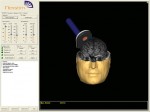Sep 27, 2006
Allen Brain Atlas
Read the full story
08:21 Posted in Neurotechnology & neuroinformatics | Permalink | Comments (0) | Tags: neuroinformatics
Aug 21, 2006
Post-doc position in Neural Information Processing available at Ulm University (Germany)
From the Neuro-IT mailing list
The Department of Neural Information Processing at the University of Ulm invites applications for a post-doc (or PhD student) position to begin November 1 2006, or later.
The Institute for Neural Information Processing at the University of Ulm (Germany) has two full professors, 4 postdocs and about 12 students and researchers in different areas of neural network research. Ongoing work includes mobile autonomous robots, computer vision, neural modelling, and pattern recognition.
Successful applicants will be expected to conduct research involving:- pattern recognition or sensor fusion with artificial neural networks, or
- information processing in networks of spiking neurons, or
-large associative memory systems with possible applications in autonomous vehicles, bioinformatics, medicine, speech or vision, or modelling and recognition of emotions.
Post-doc candidates should have a recent PhD-degree for example in computer science, physics, mathematics or electrical engineering.They will have some small teaching obligations, so some knowledge of German would be useful.
Applications for PhD-work are also possible. In this case the applicants should already have some experience in one of the fields mentioned above.
The appointment will be for at least 2 years. Salary will be BAT IIa (details depend on age and family status).
See for application details http://www.informatik.uni-ulm.de/neuro/
13:05 Posted in Research institutions & funding opportunities | Permalink | Comments (0) | Tags: neuroinformatics, artificial intelligence
Jul 18, 2006
BrainMap
BrainMap is an online database of published functional neuroimaging experiments with coordinate-based (Talairach) activation locations. The goal of BrainMap is to provide a vehicle to share methods and results of brain functional imaging studies. It is a tool to rapidly retrieve and understand studies in specific research domains, such as language, memory, attention, reasoning, emotion, and perception, and to perform meta-analyses of like studies.
BrainMap was created and developed by Peter T. Fox and Jack L. Lancaster of the Research Imaging Center of the University of Texas Health Science Center San Antonio.
00:11 Posted in Neurotechnology & neuroinformatics, Research tools | Permalink | Comments (0) | Tags: neuroinformatics
Jul 03, 2006
Navigated brain stimulation
Via Emerging Technology Trends
A young Finnish company, Nexstim, has developed a non-invasive brain scanning and stimulation system called navigated brain stimulation (NBS). This system is already in use in 20 hospitals worldwide.

From the company's website:
Medical professionals have always dreamt of the ability to actively reach into the brain - touch instead of looking. Modern brain scanners, such as MRI, already offer sophisticated views into the human brain. Yet, these images are passive views of structures.
Nexstim's Navigated Brain Stimulation (NBS) system reaches actively into the brain. NBS guides the precise delivery of targeted transcranial magnetic stimulation (TMS) pulses to discrete brain areas. The eXimia NBS system is the only device available for accurate prediction of the TMS stimulus location and dose within the human brain.
The safe and non-invasive mapping using eXimia NBS can support neurologists and neurosurgeons to diagnoze and treat the human brain diseases, trauma, and dysfunctions.
The earliest possible diagnosis of neuronal disorders rely on detection of functional changes with active, interventive tools such as NBS.

23:52 Posted in Neurotechnology & neuroinformatics | Permalink | Comments (0) | Tags: neuroinformatics
Jun 18, 2006
Artificial hippocampus to help Alzheimer's patients
Via Medgadget
According to journalist Jennifer Matthews (News14Carolina), neuroscientist Theodore Berger has developed the "first artificial hippocampus", which should help people suffering from Alzheimer's disease to form new memories.

"There's no reason why we can't think in terms of artificial brain parts in the same way we can think in terms of artificial eyes and artificial ears," said Theodore Berger, who does research at the University of Southern California.
Berger believes this new technology will help not only Alzheimer's disease patients, but also individuals suffering from other CNS diseases such as epilepsy, Parkinson's disease or stroke. Also, with this new technolgy, the brain would gain help in information processing. A computer chip will reroute the information, bypassing damaged area(s) of the hippocampus
18:26 Posted in Brain training & cognitive enhancement | Permalink | Comments (0) | Tags: neuroinformatics
Jun 01, 2006
MEDGADGET: Neurotechnology Provides Hope for the Paralyzed
Via Medgadget

Cyberkinetics Neurotechnology Systems Inc. is currently focused on the commercialization of two proprietary platforms for neural stimulation, neural sensing in the brain and real-time neural signal decoding technology. These unique and powerful platforms can restore sensation, communication, limb movement as well as other bodily functions.
The BrainGate™ Neural Interface System is currently the subject of a pilot clinical trial being conducted under an Investigational Device Exemption (IDE) from the FDA. The system is designed to restore functionality for a limited, immobile group of severely motor-impaired individuals. It is expected that people using the BrainGate™ System will employ a personal computer as the gateway to a range of self-directed activities. These activities may extend beyond typical computer functions (e.g., communication) to include the control of objects in the environment such as a telephone, a television and lights...
The NeuroPort™ System is an FDA cleared medical device intended for temporary (< 30 days) recording and monitoring of brain electrical activity.
The NeuroPort™ System is based on Cyberkinetics' BrainGate™technology and consists of two parts, the NeuroPort™ Cortical Microelectrode Array (NeuroPort™ Array) and the NeuroPort™ Neural Signal Processor (NeuroPort™ NSP). The NeuroPort™ Array senses action potentials from individual neurons in the brain. The NeuroPort™ NSP records these high resolution signals and provides a physician with the tools to analyze them...
18:40 Posted in Neurotechnology & neuroinformatics | Permalink | Comments (0) | Tags: neuroinformatics







